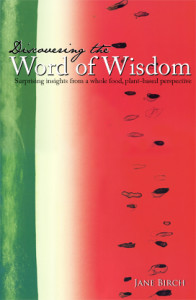By Jane Birch
Note the pronoun “these” in verse 15 of D&C 89:
14 All grain is ordained for the use of man and of beasts, to be the staff of life, not only for man but for the beasts of the field, and the fowls of heaven, and all wild animals that run or creep on the earth;
15 And these hath God made for the use of man only in times of famine and excess of hunger.
Over the past few decades there has been some controversy about what this pronoun refers to. Interestingly, before that time, there was no ambiguity. For the first hundred years after the Word of Wisdom was revealed, Latter-day Saint Church leaders and others who commented on this verse interpreted “these” to refer to the animals in verse 14.
Does “These” Refer to the Grains?
As criticism of grain (especially wheat) in our society became popular, some Latter-day Saints began to suggest that “these” could refer to the “grains” which are the subject of the preceding verse. Elder Joseph Fielding Smith refuted this interpretation as early as 1947:
Neither is it the intent of this revelation to include grains and fruits in the restriction placed upon meats, that they should be used only in famine or excess of hunger. The antecedent of “these” in verse 15, may not be clear, but common sense teaches us that it does not refer to grain in the preceding verse.” [Joseph Fielding Smith, Church History and Modern Revelation (n.p.: Council of the Twelve Apostles of The Church of Jesus Christ of Latter-day Saints, 1947-1950)].
In verse 14, God declared grains to be the “staff of life.” The “staff of life” means the staple or foundation of the diet, which is where the bulk of one’s calories come from. Obviously, grains cannot be the staff of life if one uses them only in times of famine and hunger, so of all the possible interpretations, there doesn’t seem to be any scriptural support for this one. I have written more on this topic here: “The Staff of Life.”
Does “These” Refer to Wild Animals?
Some people have suggested that the pronoun “these” refers to just the wild animals. Elder Ezra Taft Benson wrote:
It seems to me that the following should be avoided on the Sabbath: [he includes a long list of activities, among which is] Engaging in sports and hunting “wild animals” which God made for the use of man only “in times of famine and excess of hunger.” (See D&C 89:15.) [Ezra Taft Benson, “Keeping the Sabbath Day Holy?” Ensign (May 1971).]
Note that Elder Benson does not claim that verse 15 refers only to wild animals (the context of his address is about hunting and so his focus is on wild animals and not the use of meat more generally). Although Elder Benson does not make this claim, others have (whether citing Elder Benson or not). However, it is hard textually to establish this as the definitive meaning, particularly in light of other scriptures which do not make this distinction between wild and domesticated animals.
Does “These” Refer to the Animals in Verse 14?
I believe the pronoun “these” refers to all the animals mentioned in verse 14 and that God is telling us that animal life is for our use in times of genuine need. Verse 12 refers to beasts and fowls “to be used sparingly.” Verse 13 qualifies this which the additional emphasis that it is pleasing to God that they not be used except under certain conditions. Verse 14 includes the previous-mentioned beasts and fowls and adds “all wild animals that run or creep” and states these are to be used only in times of extreme need: “times of famine and excess of hunger.” Each verse points in the same direction but the limits put on the use of meat are progressively emphasized.
Perhaps all of these verses are conveying the same basic principle but stated in various ways that accommodates our varying levels of reception and desire to hear the word of God. Some feel comfortable stopping with the word “sparingly.” Others would read the entire sequence and conclude that the word “sparingly” suggests we are to spare the life of the animal when we can get what we need from the wholesome plant foods the Lord has provided for us.
See also: Chapter 2 – The Flesh of Beasts from Discovering the Word of Wisdom: Surprising Insights from a Whole Food, Plant-based Perspective by Jane Birch
Last updated: February 2, 2019




Good points, those small details which are easily overlooked over time in reading section 89.
I also like the part of the verse close to the end of the section. “who remember to keep and do these sayings…”
To me, the word remember has key implications: Remember as in perhaps a ‘waking up’ to what was once overlooked and/or forgotten, or a waking up to, or even a realization, to what was once known and understood. It is interesting to consider different possibilities with the one word!
Beautiful! Thanks Owen!
The verse says, “And it is pleasing unto me that they should NOT be used, only in times of winter, or of cold, or famine.” What if this means that they shouldn’t be used only in times of famine,etc?
Hi Jessica! Good question. Note that the comma in this verse clarifies the meaning of the verse by providing a pause at the end of the phrase, “it is pleasing unto me that they should not be used.” It then concludes with the few times where it may be appropriate to use animal flesh (“in times of winter, or of cold, or famine”). LDS Church leaders inserted that comma to add clarity and make it difficult to misinterpret the verse. I’ve written extensively on this added comma in this paper, “Questioning the Comma in Verse 13 of the Word of Wisdom.” In short, there is no evidence to support the alternative interpretation you mentioned in your comment. I hope this is helpful!